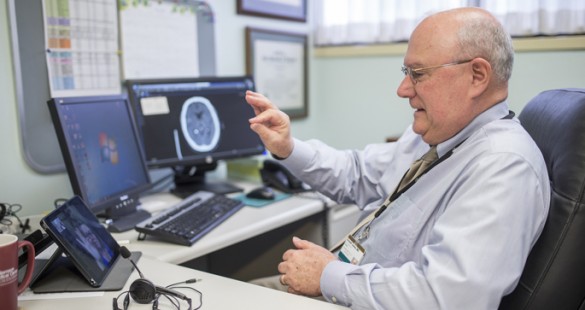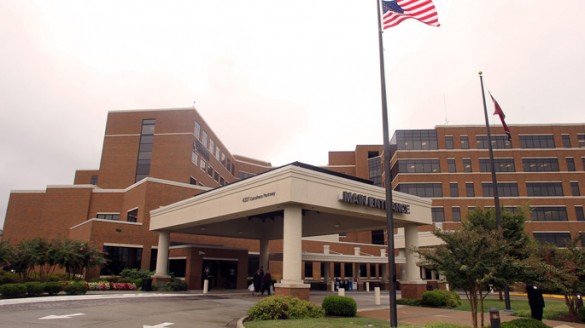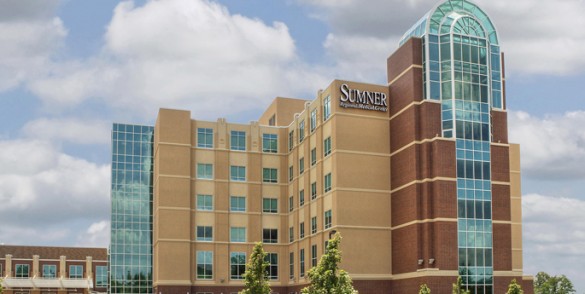
In less than three years, a teleneurology network launched by Vanderbilt University Medical Center (VUMC) has expanded from one partner hospital to nine.
Laughlin Memorial Hospital in Greeneville, Tennessee, is the latest network member. Williamson Medical Center, which signed up in October 2013, was the first.
The network allows VUMC neurologists to remotely diagnose and assess the severity of strokes and other neurological illnesses. Using telemedicine technology, they review CT scans, conduct patient examinations and confer with ER physicians.
“We are helping them with a treatment decision that is very complex,” said Kenneth Gaines, M.D., MBA, professor of Clinical Neurology. “The average ER physician doesn’t see a stroke patient that often.”
But critical decisions have to be made quickly that largely determine whether and how well patients survive strokes. The neurologists can assess whether a patient has suffered an ischemic or hemorrhagic stroke, if the clot-busting drug tPA should be administered and whether the patient should be transferred.
The neurologists can also determine if the patient is experiencing an illness that mimics stroke symptoms, such as Bell’s palsy.
“The misdiagnosis rate for stroke in emergency rooms is about 30 percent,” Gaines said. “About a third of people are misdiagnosed. Either the stroke is missed — it was actually a stroke and the doctor didn’t diagnose that — or the doctor called it a stroke and it was actually something else.”
The VUMC neurologists also assist ER physicians treating patients experiencing seizures, migraine headaches and other neurological episodes. The HIPPA-compliant communications occur via iPads using FaceTime for video conferencing, Jensis for medical imaging and StarPanel for medical records.
“It doesn’t make sense for us to transfer every patient to this facility here in Nashville for stroke or epilepsy or anything else, but what you have got to do is be able to make that triage determination very quickly,” Gaines said. “It is not about us transferring all of a hospital’s stroke patients to Vanderbilt. It is about us transferring the right patients here.”
Of 976 consultations neurologists conducted from Feb. 26, 2014, to April 30, 2015, the vast majority of patients — 87 percent — were treated and discharged from the partner hospitals, according to a report presented by VUMC to the Tennessee Medical Association.
Surveys of physicians at the community-based hospitals showed 94 percent found the service to be satisfactory or excellent, while only 6 percent rated it unsatisfactory, the report said.
Patients transferred to VUMC, which is a Joint Commission-certified Advanced Comprehensive Stroke Center, require highly specialized care. For instance, neurologists and neurosurgeons at the Vanderbilt Stroke Center perform intra-arterial surgeries to remove blockages from blood vessels in the brain with ischemic strokes.
“Left untreated, that patient would have a terrible prognosis — a pretty high mortality rate,” Gaines said. “But treated within a reasonable time frame (within six hours or less), if we can get them down here fast enough to do that kind of a procedure, we have a much better change of a good outcome.”
Patients who respond to tPA quickly administered at the community-based hospitals would not require intra-arterial surgery.
The Vanderbilt Stroke Center also treats patients who have experienced hemorrhagic strokes in its critical care unit.
Other partner hospitals in the teleneurology network in Tennessee include Blount Memorial Hospital in Maryville; NorthCrest Medical Center in Springfield; Sumner Regional Medical Center in Gallatin; Riverview Regional Medical Center in Carthage; Livingston Regional Hospital in Livingston; Sycamore Shoals Hospital in Elizabethton; and Franklin Woods Community Hospital in Johnson City.
Many Tennessee hospitals don’t staff neurologists because of a nationwide shortage of the specialty physicians.
“It is our desire to develop clinical partnerships with our hospitals to develop a system of care for stroke and neurological diseases that produces the best outcomes for our patients,” Gaines said. “Telemedicine technology is one part of the system that fosters that partnership.”















